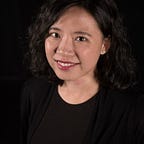A new adventure: seeing the world as an entrepreneur
Since starting out with my venture, I have made some adjustments to PinkPower, a journalistic startup designed for social platforms. I believe it’s become clearer and more practicable. In my previous post, I said PinkPower was designed to be a bridge between business owners — those who want to reach the LGBT Chinese market — and the LGBT community. Yes, but how?
Every time I describe PinkPower, people get only a vague image of it. Part of the reason is that even I was not sure what on earth PinkPower looked like. But during a discussion with Prof. Jeff Jarvis, the business gradually unfolded.
B2B or B2C?
It could be both. The first one would be an online business publication for entrepreneurs who want to target China’s LGBT market. They would be informed about opportunities and risks in this market when they read stories on PinkPower. Besides, PinkPower would provide business consulting as well — the ideal revenue stream.
The other approach is a lifestyle site for LGBT individuals. PinkPower would introduce LGBTs to the latest products with appealing and convincing stories about brands, lives of business owners, etc. Of course, those are advertisements, which mean money.
Although Jeff emphasized that I cannot make it both B2B and B2C at the same time “because you cannot compete with your clients,” I’m still experimenting with both.
On the B2B side, one article published on WeChat is about an entrepreneur whose travel agency for gay people failed because his investor suddenly withdrew from the deal under government pressure. I also listen to investors’ opinions. One told me what investors care about when looking to invest in LGBT projects is the same as in any other non-LGBT project: return on investment. This investor said, “China’s investment market is not ready for any project only for social responsibilities or social influence if it can’t pay back.” Meanwhile, Blued, the most successful speed-dating app for gay men in China, completed Series C+ financing at the beginning of 2017. The investor is run by XinJingBao, a mainstream newspaper in Beijing.
The most interesting part in Blued’s case is that every newspaper in China is government-backed. But I’m highly doubtful it’s a signal of a new relationship between the authorities and the LGBT community. As far as I observed, China’s LGBT market is still hidden and not free, and its $300 billion market valuation is a number that so far exists only in aspects of theoretical research, which is no good for my project. It’s easy to keep out of the affair if I just do news reporting on this market, but if I want to do business in this market, that’s totally different. Lack of business activities means lack of audience for PinkPower, which in turn means lack of revenue.
On the B2C side, I recently introduced my audience to a makeup brand for men. The business owner provides a 30% discount for my readers. The deal was only 10% at first, but Jeremy Caplan encouraged me to renegotiate it. Next time, when I’m ready to ask more for PinkPower itself, I will do so.
A lesson on money
Speaking of money, I did get $1 in angel capital from Jeff. It’s not a joke; on the contrary, there’s an important lesson behind it. One day I told Jeff I had tried to persuade a business owner in China to sponsor my potential social event for LGBTs in New York, but he turned me down. “Of course he wouldn’t do that,” Jeff said. “His market is not here.”
I will remember all my life that a professor in New York once told me that people, especially business people, don’t spend money to make friends, or for fun. They spend money to make more money.
Perhaps this is the first serious lesson on money in my life. In the past I was too young, too naive and too spoiled to think about money issues. I saw writing as supreme to doing business (or to anything else) and looked down on money as if it were nasty, superficial and sophisticated. It turned out I knew nothing about money and felt shameful asking for it.
Something is changing in my life. As a journalist, when I meet people and talk to people, I am usually wondering automatically what kind of stories they have. Now, as an entrepreneur, I’m thinking about how they make money instead. It doesn’t feel as bad as I imagined. In my life, though, it’s a totally new adventure.
